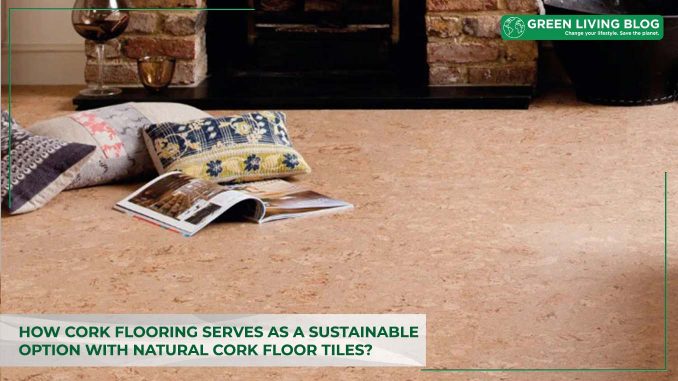
Are you looking for a flooring option that is eco-friendly, durable, and comfortable? Then you might want to consider cork flooring. Here’s why!
What is Cork Flooring?
 Cork flooring is made from natural cork, which is harvested from the bark of cork oak trees.
Cork flooring is made from natural cork, which is harvested from the bark of cork oak trees.
Cork oak trees are native to the Mediterranean region, where they grow in forests that provide habitat for many animals and plants.
Cork harvesting is a sustainable process that does not harm the trees or the environment.
Why is Cork Harvesting Sustainable?
Cork is harvested by skilled workers who use axes to peel off the bark from the trunks of cork oak trees. This process does not harm the trees or affect their growth. In fact, it helps them to regenerate and live longer.
Cork oak trees can live up to 300 years and produce cork every nine years after they reach maturity (around 25 years old). The first harvest, called “virgin cork”, is of lower quality and used for products like insulation. The subsequent harvests, called “reproduction cork”, are of higher quality and used for products like wine stoppers or cork floor tiles.
What are the environmental Benefits of Cork used for Cork Floor Tiles?

Cork is a renewable and biodegradable material that has a low ecological footprint.
Here are some of the environmental benefits of cork:
- Cork harvesting helps to preserve cork oak forests, which are home to many plant and animal species, some of them endangered. Cork oak forests also prevent soil erosion and desertification.
- Cork harvesting helps to fight climate change by absorbing carbon dioxide (CO2) from the atmosphere. Harvested cork trees absorb 3-5 times more CO2 than non-harvested trees. Cork oak trees in Portugal alone help offset 10 million tons of carbon every year.
- Cork production requires minimal energy and water and generates almost no waste. Cork can be recycled and reused for different purposes, such as flooring, insulation, or compost.
What are the ethical Considerations of Cork in Cork Flooring?
Cork harvesting is a traditional industry that respects the culture and heritage of the local communities.
It also provides social and economic benefits for the people involved in the industry.
Here are some of the ethical considerations of cork flooring:
- Cork harvesting creates employment opportunities for rural areas, where other sources of income are scarce. Cork harvesting supports around 100,000 jobs in Portugal, Spain, Morocco, Algeria, Tunisia, Italy, and France.
- Cork harvesting ensures fair labour practices and decent working conditions for the workers. Cork workers are paid according to their skills and experience and receive training and safety equipment. They also have access to health care and social security.
- Cork harvesting promotes sustainable development and innovation in the industry. Cork producers invest in research and development to improve the quality and efficiency of cork products. They also collaborate with environmental organizations and certification bodies to ensure best practices and standards.
The top Eco Benefits of Cork Flooring
- Cork flooring is naturally resistant to mould, mildew, insects, and fire.
- It also has excellent thermal and acoustic insulation properties, which means it can keep your home warm in winter and cool in summer while reducing noise levels.
- Cork flooring is also soft and cushiony underfoot, making it ideal for areas where you stand or walk, such as kitchens, living rooms and bedrooms.
- Cork flooring can also reduce the impact on your joints and spine and prevent injuries from falls.
- Cork flooring comes in various styles, colours, and patterns, so you can find the one that suits your taste and decor.
- Cork flooring tiles are easy to install, maintain and repair. You can simply glue them down to any subfloor or use a floating system that snaps them together without glue or nails.
- To clean them, you just need to sweep or vacuum regularly, and occasionally damp mop with a mild detergent.
One of the most popular types of cork flooring is natural cork floor tiles, which are made from pure cork granules that are compressed and baked into tiles.
Natural cork flooring designs have a unique look and texture that can add warmth and character to any room.
Natural cork floor tiles are a great choice for anyone who wants to have a beautiful, comfortable, and sustainable flooring option in their home. They are not only good for you and your family, but also for the planet and its biodiversity. By choosing cork flooring, you are supporting an ancient industry that respects nature and preserves its resources for future generations.
Closing Thoughts
Cork is a natural, renewable, biodegradable, recyclable, and versatile material with many advantages for the environment and society. Cork harvesting is a sustainable and ethical industry that respects nature and people. By choosing cork flooring, you are supporting a green economy and a better future for our planet while decorating your home with a natural, durable, and aesthetic material that will give you the home comfort you desire.
![]()
Author Profile
- Online Media & PR Strategist
- Blogger and Educator by Passion | Senior Online Media & PR Strategist at ClickDo Ltd. | Fascinated to Write Lifestyle Blogs in News & Education I have completed a journalism summer course at the London School of Journalism and manage various blogs.
Latest entries
 Green Expert GuidesMarch 28, 2025Lisbon Living: Where Sustainable Charm Meets Urban Energy
Green Expert GuidesMarch 28, 2025Lisbon Living: Where Sustainable Charm Meets Urban Energy EnvironmentJanuary 21, 2025Buying Eco-Friendly Homes: 6 Eco Questions to Ask Your Real Estate Agent
EnvironmentJanuary 21, 2025Buying Eco-Friendly Homes: 6 Eco Questions to Ask Your Real Estate Agent BusinessJanuary 16, 202510 Benefits of used Office Furniture when Refurbishing an Office
BusinessJanuary 16, 202510 Benefits of used Office Furniture when Refurbishing an Office Best practicesJanuary 6, 2025Eco-Friendly Event Planning: Mastering Sustainable Waste Management for Holiday Celebrations
Best practicesJanuary 6, 2025Eco-Friendly Event Planning: Mastering Sustainable Waste Management for Holiday Celebrations






Leave a Reply
You must be logged in to post a comment.